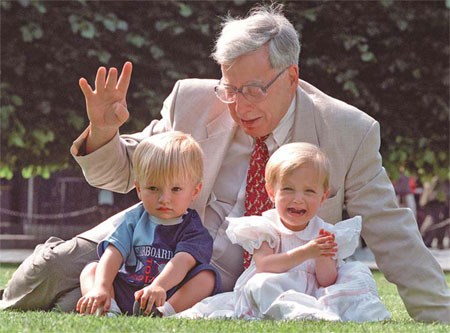IVF pioneer Robert Edwards dies
|
Professor Robert Edwards, British pioneer of IVF treatment, with two of his test tube babies, Sophie and Jack Emery, who celebrated their second birthday in London on July 20, 1998. Edwards, a Nobel Prize winner for medicine, has died aged 87. Alastair Grant / Associated Press |
Scientist and Nobel Prize winner 'will be greatly missed'
Robert Edwards, a Nobel laureate from Britain whose pioneering in-vitro fertilization research led to the first test tube baby and has since brought millions of people into the world, has died aged 87.
The University of Cambridge, where he was a professor, said Edwards died peacefully in his sleep on Wednesday at his home just outside Cambridge.
With Dr Patrick Steptoe, Edwards developed in-vitro fertilization, or IVF, which resulted in the birth in 1978 of the world's first test tube baby, Louise Brown. At the time, the two were accused of playing God and interfering with nature.
Since then, the European Society for Human Reproduction and Embryology estimates that about 5 million babies have been born using the technique, which creates embryos in the laboratory before transferring them into a woman.
Edwards' "success in IVF was one of the 20th century's great medical feats, pursued at long odds and despite great opprobrium", International Federation of Fertility Societies President Joe Leigh Simpson said.
"He laid the groundwork for infertile couples worldwide to have children, with 1 to 4 percent of all babies in Europe, North America and Australia now born by assisted reproductive technologies started by Professor Edwards. He will be greatly missed," he added.
Experts say about 350,000 babies are born by IVF every year, mostly to people with fertility problems, single people and gay and lesbian couples.
"Edwards was an extraordinary scientist," said Dr Peter Braude, emeritus professor of obstetrics and gynecology at King's College London, who was at Cambridge when Edwards and Steptoe were developing IVF.
"There was such hysteria around the kind of work he was doing," Braude said, noting that Edwards stopped his research for two years after he published details on how he had created embryos in the laboratory. "He wanted to work out what the right thing to do was, whether he should continue or whether he was out on a limb."
After Brown was born, Braude recalled a celebration at Cambridge, where scientists toasted Edwards' and Steptoe's achievement by drinking champagne out of plastic cups.
Braude said public opinion has evolved considerably since then.
"I think people now understand that Edwards only had the best motivation," he said. "There are few biologists that have done something so practical and made a huge difference for the entire world."
In 2010, Edwards was awarded the Nobel Prize in Medicine or Physiology for the development of IVF. Steptoe had already died - Nobel prizes are not awarded posthumously.
The Roman Catholic Church denounced the award, arguing that human life should only begin through intercourse and not artificially. The Vatican said Edwards "bore a moral responsibility for all subsequent developments in assisted reproduction technology and for all abuses made possible by IVF".
In 2011, Edwards was knighted by Queen Elizabeth "for services to human reproductive biology".
(China Daily 04/12/2013 page10)















